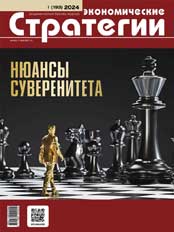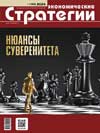2023: Strengthening the State Sovereignty and Sustainability of Russia’s Strategic Development in Conditions of Turbulence
DOI: 10.33917/es-1.193.2024.70-75
The article dwells on the changes in the Market Index of “Economic Strategies” (MIES) for eleven months of 2023.
Contribution of demand and supply indicators to MIES is assessed. Analysis of industrial production is carried out.
References:
1. Itogi goda s Vladimirom Putinym: pryamaya liniya s grazhdanami i bol’shaya press-konferentsiya s predstavitelyami SMI 14 dekabrya 2023 goda [Results of the Year with Vladimir Putin: Direct Line with Citizens and a Large Press Conference with Media Representatives on December 14, 2023]. Ofitsial’nyy sayt Prezidenta RF, available at: http://kremlin.ru/events/president/news/7299
2. Sotsial’no-ekonomicheskoe polozhenie Rossii v yanvare — noyabre 2023 goda: Doklad [Socio-economic Situation in Russia in January — November 2023: Report]. Federal’naya sluzhba gosudarstvennoy statistiki, available at: https://rosstat.gov.ru/storage/mediabank/osn-11-2023.pdf
3. Frenkel’ A.A., Tikhomirov B.I., Surkov A.A. Itogi strategicheskogo razvitiya Rossii v yanvare — aprele 2023 goda — luchshe pessimistichnykh prognozov [Outcomes of Russia’s Strategic Development in January-April 2023 are Better than Pessimistic Forecasts]. Ekonomicheskie strategii, 2023, no 4, pp. 86–91, DOI: 10.33917/es-4.190.2023.86-91
4. Obrashchenie Prezidenta RF V.V. Putina v svyazi s predsedatel’stvom RF v Ob”edinenii BRIKS [Address by the President of the Russian Federation V.V. Putin in Connection with the Russian Federation’s Chairmanship of the BRICS Association]. Ofitsial’nyy sayt Prezidenta RF, available at: http://kremlin.ru/events/president/news/73202
5. Kontseptsiya predsedatel’stva RF v Sodruzhestve Nezavisimykh Gosudarstv v 2024 godu [Concept of the Russian Federation’s Chairmanship of the Commonwealth of Independent States in 2024]. Ofitsial’nyy sayt Prezidenta RF, available at: http://kremlin.ru/events/president/news/73203













